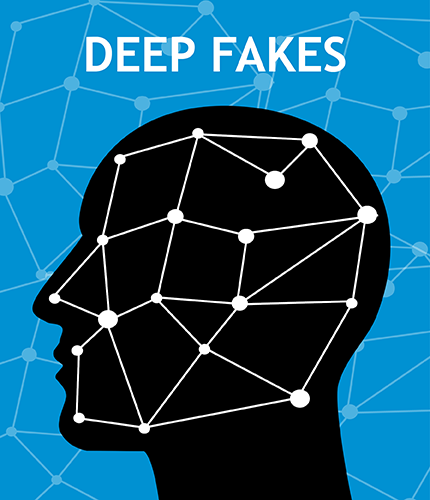European Cyber Security Action Month: What are Deep Fakes?
Deep Fakes - what's behind them?
Fake news can be spread in many ways. Deep fakes are one method of spreading convincing fake news. "Deep Fake" is made up of the terms Deep Learning, i.e. machine learning, and Fake. That is, Deep Fakes are videos or audio recordings that are falsified or entirely recreated using Artificial Intelligence.
Through this technique, it is possible to create video or audio recordings of people and have them say or do things that they did not say or do at all. To be sure, professional deep fakes still require large amounts of computing power and expert knowledge and have been rare. In theory, however, the technology can be used to expose unpleasant neighbors, get ex-boyfriends into trouble, or even commit financial fraud. Deep fake technology would also be particularly explosive if it were used in political contexts, for example to defame political opponents with fake video or audio recordings.
All fake?
Truth and lies are often difficult to distinguish on the Internet. In some cases, fake news was clicked millions of times and spread much faster than the real facts. Corona, political elections or 5G are just a few examples of overall social issues that are accompanied by mass false news of all kinds. The actors behind the untruths on the web have a wide variety of reasons: Sometimes a political agenda is to be pushed through, other times fake news helps the pursuit of economic interests, in yet another case someone believes in conspiracy theories and wants to defend them against the facts.
The BSI looks at such processes from a technical perspective and brings so-called Deep Fakes closer to citizens during Cyber Security Month in October.
In the first episode of the podcast "Update available", the BSI looks at Deep Fakes and provides exciting insights and example on the topic. The podcast can be accessed via the BSI website. An explanatory video on the topic of Deep Fake can also already be found there, and the offering will be continuously expanded during the ECSM.
In addition, expert livestreams will take place on 07.10., 21.10. and 28.10. (each starting at 11 am). In these livestreams, which the BSI is implementing together with the Federal Agency for Civic Education (bpb), experts will go in search of truth and relevance in the digital space. In conversation, they explain how cyberspace works in very basic terms, how to distinguish truth from deception and how political actors, companies and individuals can protect themselves from disinformation. The livestreams will be available on the YouTube channel of the BSI offered.
Further information

